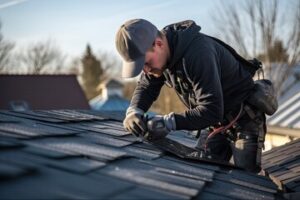Roofers In South Jersey install, replace and repair roofs on homes and commercial buildings. Their workplace environment may vary depending on the nature of the project.

Installation projects involve installing underlayment and roofing materials such as shingles, tiles or metal panels. Roofers also perform standard maintenance tasks like repairing leaks and filling holes.
Roofers offer a variety of services for residential homes, including installation and repairs. They often work directly with homeowners, helping them navigate insurance claims and finding financing options. They also have an understanding of a wide range of roofing materials and can advise homeowners on what types would best suit their needs.
Some Roofers are what’s known as “storm chasers,” traveling to areas that have been hit hard by weather to offer their services. They typically pitch their services during or right after a storm, and they can help homeowners through the insurance process. They may also provide a sales person who will be your point of contact until the job is done.
Commercial
Commercial roofers work on large-scale buildings and may use different materials than residential roofs. These can include steel, aluminum, concrete shingles or tiles. These roofs are usually designed to withstand heavy winds, snow and rain.
A commercial roofer often works with engineering firms, roof consultants and property managers who demand specific flat roofing products such as EPDM, PVC or TPO. In addition, commercial roofers are experienced with the complexities of high-rise buildings that require special equipment to hoist material and tools to the roof’s surface.
Keeping strong relationships with clients is key to winning business. Skujins says he avoids projects where the client will give out his number to several different people for quotes. He tells his point of contact he’ll deal with them directly, which helps him maintain a solid relationship and prevents confusion on the job site.
Unlike residential roofers who are typically paid by the hour, many commercial roofers are paid per square foot. This means it can be easier for an inexperienced commercial roofer to lose money on a job and go out of business. This is why Skujins suggests new commercial roofers start bidding on smaller jobs that are less expensive to win.
Storm Chaser
If a roofing contractor shows up at your door uninvited and claims to have seen damage to your roof, that is a major red flag. Roofing contractors typically work through referrals or advertising, and they do not just randomly show up after storms. If you get a call from someone claiming to have seen your damage and wants to do an assessment, tell them you will reach out to your insurance company and preferred local roofer for a quote.
Storm chasers are opportunists who travel around the country following natural disasters to make money on repair jobs. They typically prey on people’s emotional and financial vulnerabilities in a stressful situation. These opportunists will often arrive in town after a storm and offer to fix roofs for low prices. They will usually accept insurance claim checks and may use cheap materials or shoddy workmanship in order to quickly turn around their jobs and leave the area.
Some of these companies will even go so far as to create false damage on the spot in order to inflate an insurance claim. For example, they might try to stomp on the roof with their feet or use golf balls or other heavy objects to create dents and damage. These opportunistic companies are also known to overcharge for their services and take advantage of homeowners who are stressed after a storm.
One of the most significant issues with storm chasers is their lack of knowledge of local building codes and regulations. Since they are typically working in unfamiliar areas, their repairs are frequently not up to par and do not comply with industry standards. This can lead to additional problems down the road for the homeowner, such as leaks or other serious issues that could have been prevented with proper installation.
Another thing to keep in mind is that most of the time, when a storm chaser comes to do an inspection, they are not going to be able to offer any type of warranty for their services. This is because they are not a permanent fixture in the community, so they won’t be around to help if you run into any problems with your roof down the line. In contrast, a local roofer will be able to provide you with a warranty that you can depend on.
Retail Sales
Some roofers offer a service layer on top of the standard roofing services. They provide a dedicated point person who will answer your questions and interface with the crew for you. They also offer zero-interest financing. This type of roofer is large enough to have a customer service department and multiple crews available. They often offer a variety of materials at different prices and are flexible with pricing.
During the sales process, learn about your customers’ goals for their homes. For example, a new kitchen may encourage home chefs or an added deck might make outdoor entertaining easier. Helping them understand how your roofs can help them reach those goals makes the sale easier for you.
Storm chasers are roofing companies that follow storms. They travel to areas that have been hit by a hurricane, tornado, hail storm or other natural disaster and offer roof inspections. Once they have a lead, they’ll give the homeowner an insurance estimate and help them through the insurance process. This type of roofer is typically not as competitive with pricing as other roofing companies. They also aren’t able to serve you after your roof has been fixed since they are focused on working with insurance companies.